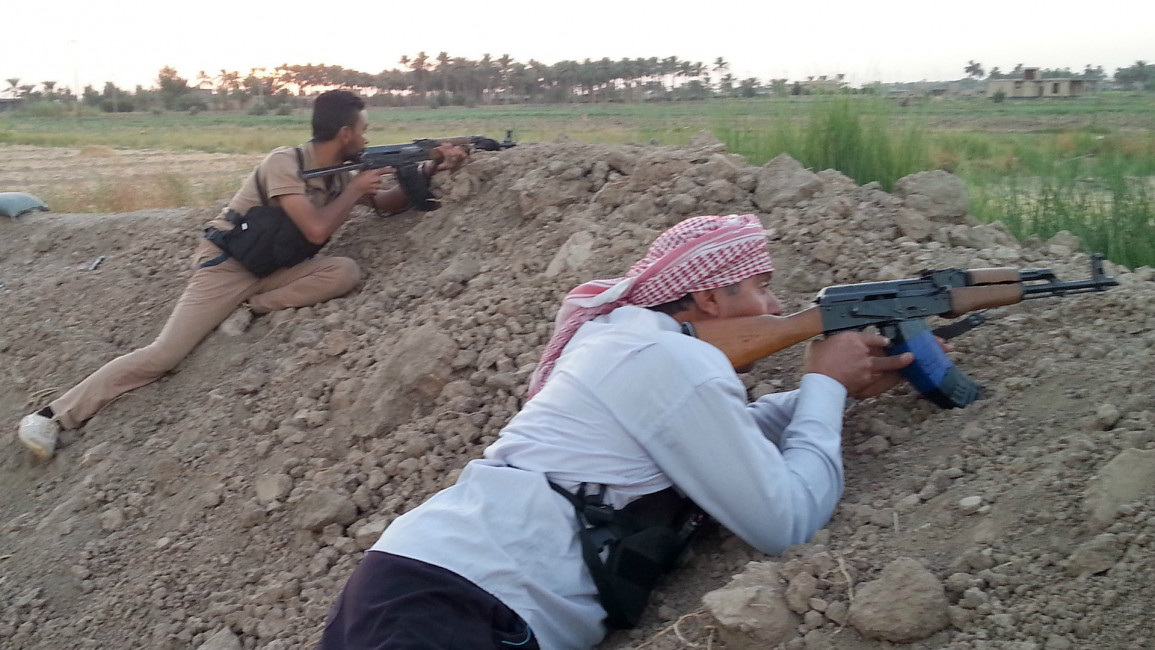Police back in charge of security in Iraq's Salahuddin
Police back in charge of security in Iraq's Salahuddin
Salahuddin police are back in charge of security in the Iraqi province after Popular Mobilisation militia withdrew, with local tribes saying they would cooperate with the force to maintain security.
2 min read
Tribal members want to protect their own areas [AFP/Getty]
Salahuddin police has taken over the security file in the province on Thursday after the Popular Mobilisation militia withdrew from Salahuddin and the tribes there said they would cooperate with the police to maintain security.
Member of the Security Committee of Salahuddin Provincial Council, Mohammad Nadhim, told al-Araby al-Jadeed:
"The Popular Mobilisation has withdrawn from most areas of the province after withdrawing from Baiji, and will in turn withdraw from all the areas of the province," pointing out that "the local police has formally taken over the security file from the Popular Mobilisation, and has started to distribute its troops according to their responsibilities."
"The Security Committee will meet with the province's tribes to put together a new plan based on the police and the tribes to provide the necessary protection for provincial areas and secure them to work on the return of displaced families," Nadhim added. "The people of the province want to be responsible for protecting their areas."
"The security situation is currently quiet in most of the province's areas, while we work to prepare our forces in coordination with the federal government to liberate Baiji again from the hands of Islamic State group (IS, formerly ISIS)," Nadhim continued, expressing his optimism that the "town will be liberated quickly."
Salahuddin's tribal council said that members of the province's tribes are eager to protect their areas and will work hard with the local police to maintain security there.
A member of the tribal council of Salahuddin, Al-Khaliq al-Jubouri, told al-Araby: "The province's tribes have risen up with the local police, has given them big support and has committed to the security plan that the police had devised."
Jubouri criticised the government for "ignoring all the calls by the province's clans who asked to participate in maintaining control of the land and protecting their areas from IS, and its dependence on the Popular Mobilisation who violated the areas and blew up residential homes and could not protect them."
Jubouri, however, said that the province will "offer its children to create forces that it would put under the guidance of the local government in preparation for the liberation of Baiji from the control of IS, after the Popular Mobilisation was unable to protect them."
Member of the Security Committee of Salahuddin Provincial Council, Mohammad Nadhim, told al-Araby al-Jadeed:
"The Popular Mobilisation has withdrawn from most areas of the province after withdrawing from Baiji, and will in turn withdraw from all the areas of the province," pointing out that "the local police has formally taken over the security file from the Popular Mobilisation, and has started to distribute its troops according to their responsibilities."
"The Security Committee will meet with the province's tribes to put together a new plan based on the police and the tribes to provide the necessary protection for provincial areas and secure them to work on the return of displaced families," Nadhim added. "The people of the province want to be responsible for protecting their areas."
"The security situation is currently quiet in most of the province's areas, while we work to prepare our forces in coordination with the federal government to liberate Baiji again from the hands of Islamic State group (IS, formerly ISIS)," Nadhim continued, expressing his optimism that the "town will be liberated quickly."
Salahuddin's tribal council said that members of the province's tribes are eager to protect their areas and will work hard with the local police to maintain security there.
A member of the tribal council of Salahuddin, Al-Khaliq al-Jubouri, told al-Araby: "The province's tribes have risen up with the local police, has given them big support and has committed to the security plan that the police had devised."
Jubouri criticised the government for "ignoring all the calls by the province's clans who asked to participate in maintaining control of the land and protecting their areas from IS, and its dependence on the Popular Mobilisation who violated the areas and blew up residential homes and could not protect them."
Jubouri, however, said that the province will "offer its children to create forces that it would put under the guidance of the local government in preparation for the liberation of Baiji from the control of IS, after the Popular Mobilisation was unable to protect them."


